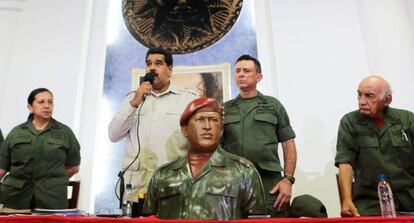Maduro uses decree to declare war on “the internal enemy”
The center was created on the day Maduro expelled three American diplomats from the country

Since Hugo Chávez was a military officer perhaps it was inevitable that would speak of his epic political deeds in military language: his electoral campaign teams were "battalions" and his social programs were "missions." His successor, Nicolás Maduro, a former union leader, does not only seek to preserve that language. That he wants to apply it literally when it comes to leading the nation seems inappropriate.
Maduro is still taking steps in that direction. The terms of the decree by which the Venezuelan president created the Strategic Center for Homeland Security and Protection (CESPPA) were revealed Thursday, on the same day he ordered the expulsion of three American diplomats. CESPPA falls under the leadership of Gustavo González López, intelligence officer and ex-commander of the Bolivarian Militias. The organization will report directly to the president of the Republic.
According to the decree, CESPPA may request and compel any public or private entity to share information. It will also have the power to decide which public records should remain sealed without consulting other criteria such as the right to access to information established in the constitution though Chávez and his followers have always refused to translate it into practices delineated within a legal framework.
All of these privileges will help the CESPPA accomplish its mission to monitor and neutralize "internal and external enemy activity." The measures that led to the creation of this military organization were published last Monday in the Gaceta Oficial, the government's official bulletin for announcements. They went unnoticed until now, overshadowed by other news published in the same papers - the dismissal of Finance Minister Nelson Merentes from his post as vice president of Economy.
It seems fortuitous, however, that this news came out on the same day that President Maduro announced that he had called Venezuelan Attorney General Luisa Ortega Díaz - a loyal party-liner - to investigate the newspaper 2001 and urge her to press for the "maximum punishment, whatever that may be." He made the announcement in a speech while visiting the office of the army's chief of staffs.
Maduro said the title on the front page of the morning paper, which referred to the lines of cars queued up to get gas in various cities around the country, was "rude and filthy." The title, "They pour the gas with a dropper," was written in the popular paper's usual style. Attorney General Ortega said she would open an investigation because the publication was trying to "cause anxiety and spread panic."
On Tuesday, Víctor Hugo Donaire, director of the radio station Morros 87.9 FM in San Juan de los Morros, the state capital of Guárico, was arrested. According to the Institute of Press and Society of Venezuela (IPYS Venezuela), the arrest was carried out while Donaire was live on his talk show, De Frente. Officers who detained Donaire said that he had disrespected the judicial police corps.
Since the beginning of his term in April, Maduro has adopted a bellicose lexicon and now he seems particularly determined to escalate conflict in Venezuela. Since last Saturday imminent yet nameless measures have come up. Their stated aim is to end the "economic" and "media" wars unleashed against the government, authorities say.
Last Tuesday the president asked the National Assembly to grant him extraordinary decree powers in order to carry out what he called "a revolution within the revolution." He plans to transform the economy, promote a new ethic, and finish off the "parasitic bourgeoisie" while he's at it.
Translation: Dyane Jean François
Tu suscripción se está usando en otro dispositivo
¿Quieres añadir otro usuario a tu suscripción?
Si continúas leyendo en este dispositivo, no se podrá leer en el otro.
FlechaTu suscripción se está usando en otro dispositivo y solo puedes acceder a EL PAÍS desde un dispositivo a la vez.
Si quieres compartir tu cuenta, cambia tu suscripción a la modalidad Premium, así podrás añadir otro usuario. Cada uno accederá con su propia cuenta de email, lo que os permitirá personalizar vuestra experiencia en EL PAÍS.
¿Tienes una suscripción de empresa? Accede aquí para contratar más cuentas.
En el caso de no saber quién está usando tu cuenta, te recomendamos cambiar tu contraseña aquí.
Si decides continuar compartiendo tu cuenta, este mensaje se mostrará en tu dispositivo y en el de la otra persona que está usando tu cuenta de forma indefinida, afectando a tu experiencia de lectura. Puedes consultar aquí los términos y condiciones de la suscripción digital.








































